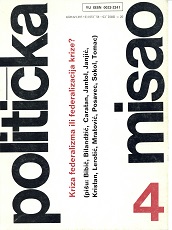Neutemeljenost kritika ustavnog modela jugoslavenske federacije
The Unfounded Criticism of the Constitutional Model of Yugoslav Federation
Author(s): Zdravko TomacSubject(s): Politics, Constitutional Law, Political Theory, Political Sciences
Published by: Fakultet političkih znanosti u Zagrebu
Keywords: Criticism; Constitutional Model; Yugoslav Federation;
Summary/Abstract: The author believes that the book The System and the Crisis affords an opportunity to appraise how well founded are the criticisms of the constitutional model of the Yugoslav federation in general. This criticism goes back to the period of the debate on the constitutional amendments in 1970— 1971. In essence it can be reduced to the following propositions: the 1971 Amendments and the 1974 Constitution are the products of compromise, and some of the solutions they offer are the result of pressures by nationalistic and separatist forces; they represent a departure from the original principles of Yugoslavia’s federal organisation, paving the path for a confederal system: both the Amendments and the Constitution, contrary to the decisions of the Antifascist Council of National Liberation of Yugoslavia, overemphasize the sovereignty of the republic and define the autonomous province as a constituent part of the federation: the Constitution is producing and reproducing a crisis: under the Constitution, the national Is regarded as being superior to the class aspect: and, finally, the 1974 Constitution meant a radical redefinition of the "Tito paradigm ". The author denies these objections, referring to his own analysis given in the book Constitutional Reform — Ten Years Later. He also suggests some basic criteria for evaluating all concepts of the socio-political system, including the prevailing constitutional concept.
Journal: Politička Misao
- Issue Year: XXI/1984
- Issue No: 04
- Page Range: 59-72
- Page Count: 14
- Language: Croatian

